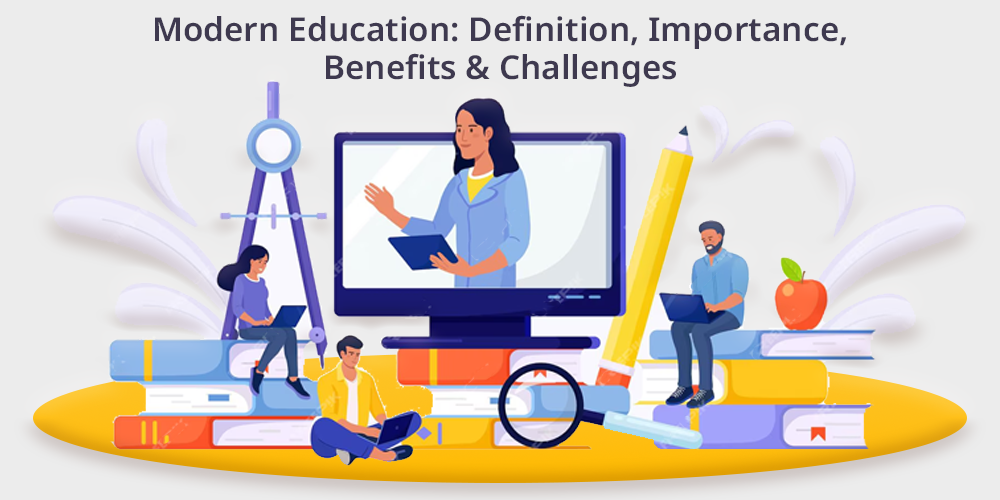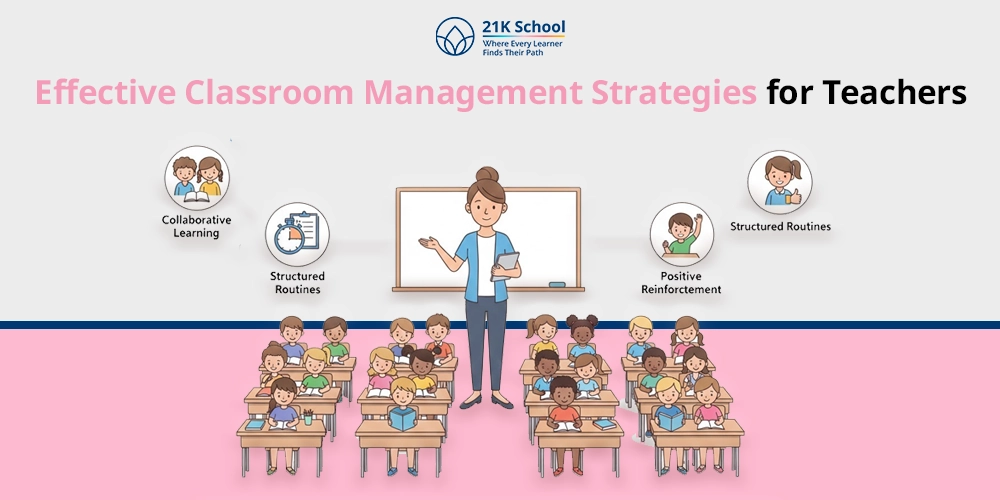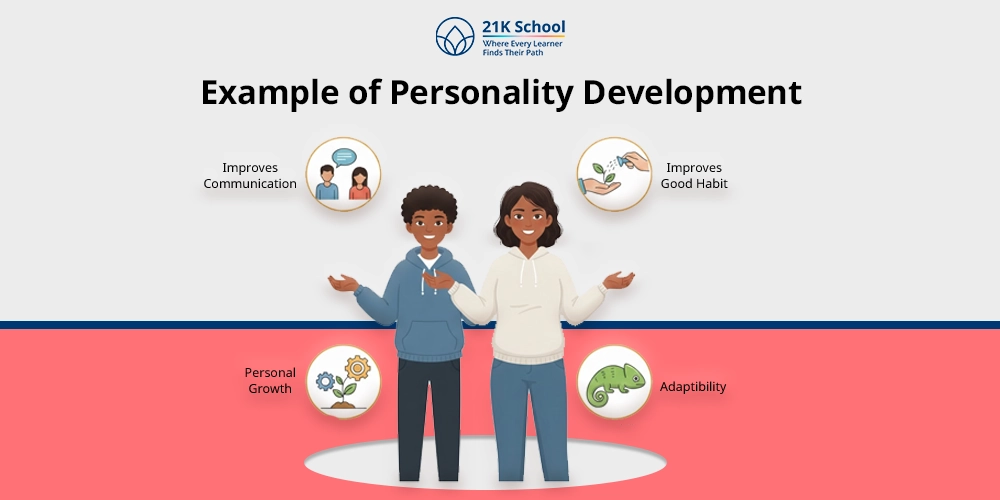
We all know that we live in a modern era and with time everything is evolving and one of the big changes has also been seen in our education system.
In the 21st century, we have moved toward modern education. But do you know what modern education is?
Modern education can be defined as a potential change or development towards the education sector. In the 21st century, every school or educational institution follows modern education by utilising innovative approaches to promote holistic development among students.
Modern education focuses on using the latest technologies and computer terminologies to provide quality education. Modern education doesn’t only focus on theoretical subjects but also aims to support children’s personality development .
Modern education also focuses on vocational education and promotes multilingual education. By emphasizing practical and experimental learning, students are encouraged to think outside the box.
Contents
What is Modern Education?

Modern education is the process of enhancing the education system through new initiatives that promote students’ overall development and creativity.
Modern education focuses on advancing critical thinking, visualization, imagination, and creativity among children.
Modern education includes the use of computers, smart educational resources, and modern teaching methods that enhance the learning experience of pupils.
Unlike traditional education which also has strengths on theoretical and moral values, modern education focuses on practical learning and enhances creativity among students.
Today, in the 21st century, most schools and educational institutions follow modern education, though a few still rely on traditional methods.
Modern education also emphasizes online learning due to its many benefits for students.
Who Introduced Modern Education in India?

Modern education was introduced during the British era by Lord Thomas Babington Macaulay in the 1830s. Modern education consists with English as a compulsory subject along with Maths and Science.
On February 2, 1835, Thomas Macaulay made a contribution to Indian Education and stated a famous “Minute on Indian Education.” In it, Macaulay emphasized the need to introduce the English language in India education and advocated for Western science and literature.
During the British regime, the British established institutes and universities with Western syllabus and curriculum . This system has changed the Indian education system to a conventional one.
Modern Education uses STEAM principles to enhance the learning approach. STEAM stands for Science, Technology, Engineering, Arts, and Mathematics.
Importance of Modern Education

Modern Education plays an integral role in the development of the country and meets the requirements of the 21st century.
Modern education focuses on holistic development among children and boosts their creativity, problem-solving ability , communication and critical thinking skills .
Modern education integrates technology into the teaching–learning process. The use of technologies and technical terminologies will boost class productivity and help create effective classroom solutions.
Many students seek guidance on how to choose an online school because one of the main aspects of modern education is online education .
Below are some reasons why modern education is essential:
- Global Exposure: Modern education is essential for global exposure. Modern education prepares pupils to compete globally and and develop global communication skills , which benefit both the student and the nation’s progress.
- Practical Skills: Modern education focuses on practical skills which is very essential to survive today’s job market. In the 21st century, skill based education is more important than theoretical knowledge .
- Boost Technological Skills: One of the major significance of modern education is to implement technology and technical terminologies in education. This enhances students’ learning capabilities and strengthens the education sector.
- New Pattern: One of the importance of Modern Education is the introduction of a new pattern in the education system, the new pattern will make study easier and helps in understanding the topics and syllabus. The new pattern also focuses on child-centered pedagogy and behavioral development.
- Enhance Teacher Student Relation: One of the key objectives of modern education is to strengthen the teacher–student relationship . Modern education doesn’t focus on a child’s behaviour and creates fear among children unless it focuses on making a friendly environment.
What is the Need for Modern Education?

Modern education is very essential to meet the changes of the 21st century, modern education is necessary to boost the productivity of teaching-learning process.
Modern education provides flexible learning opportunities which helps in following study along with extracurricular activities.
Traditional education lacks flexibility and relies mainly on moral values, ethics, and conventional methods. Below are some reasons highlighting the need for modern education:
- Enhanced Lifelong Learning Skill: One of the major needs of modern education is to create life-learning skills among students by fostering critical thinking , decision-making skills and analytical competencies in pupils.
- Fun Learning Process: Modern education focuses on fun activities which help students to be more engaged in their study sessions. This also makes class more active and promotes positivity among students.
- Enhance Curiosity: New modern education focuses on fostering curiosity among students which makes them ask questions and boost their learning resilience.
- Study Style: Modern education has more technical approaches and study styles, teachers can adapt new teaching methods tailored to students’ learning styles, which increases the likelihood of delivering quality education.
- Focus on Online Education: Modern education also focuses on providing online education. Online education provides equal opportunities to every student and focuses on quality education rather than traditional methods.
For eg. 21K school provides quality online education through advanced technology, enhancing the learning experience of all children regardless of their background.
Advantages of Modern Education

Modern education plays a crucial part in providing focused studies to students that not only foster overall development among students but also enhance the creativity, skills, and cognitive development of children. Below you can check the benefits of Modern education:
- Focused on Co-curricular Activities: Modern education focuses on co-curricular activities such as arts, drama, music, dance, etc. It helps students become more creative and enhances their overall learning experience.
- Boost Physical Activity: One key advantage of modern education is its emphasis on physical activity, which improves learning speed and keeps students physically engaged.
- Effective Learning Experience: Modern education employs effective learning strategies, leveraging technology to increase student engagement and consistency.
- Activity Based Learning: Modern education focuses on promoting activity-based learning that promotes self-paced learning. By using various activities in the classroom, it encourages student engagemen and participation in classrooms.
- Learning-Centric Approach: One of the merits of modern education is it focuses on learners’ approach and helps in developing their learning journey according to their adaptability. This approach also enhances problem-solving abilities and student empowerment.
- Equal Accessibility: Modern education ensures equal access for all, regardless of background, through tools like mobile apps, AI, video learning, and online platforms like 21K School.
Challenges with Modern Education

There is no doubt that modern education is essential; however, it still faces challenges in delivering its full potential in India.
A wide range of challenges such as inadequate resources, lack of infrastructure, lack of proper teacher training, lack of technological experience and so on creates hindrances in Modern Education.
Even in the 21st century various challenges faced by 21st century students in India.
Below you can check what are the challenges faced by Modern Education
- Inadequate Infrastructure: One of the major issues with modern education is, many rural schools doesn’t have proper infrastructure such as space, modern technologies, etc. This has created hindrances in modern education.
- Lack of Resources: In India and other developing countries modern education faces challenges due to limited access to computers, smart classrooms , and updated teaching tools.
- Old Curriculum: Despite advancements, many institutions still follow outdated curricula, which poorly align with today’s job market needs.
- Improper Teaching Method: Insufficient teacher training and outdated teaching methods limit the effectiveness of modern education. In India teachers are not well prepared for a change in their teaching techniques. This becomes tough to deal with students.
- Theory Based Education: Even in this modern world focus is laid on theoretical studies and competency based education as compared to practical learning. This creates loopholes in modern education and hindrances among students.
Evaluation of Modern Education

India has a long-standing educational tradition, dating back to the Macaulay era and evolving significantly post-independence.
Earlier education was mainly focused on theoretical subjects and aimed to promote ethics and morals but after implementing various reforms it is assumed that the need for change towards education is very essential to overcome the challenges.
Modern education’s main focus was laid on using technology and technical approaches and also to enhance creativity and practical skills among students. Here you can check the data of modern education in India .
As per the Global Data Index, 26% of the population who are between the ages of 0 to 14 are studied by using modern aspects of education.
By implementing modern education the English literacy rate has been increased to 87% which means people who can read and write English. By implementing modern education aspects numbers of primary schools have been raised to 15, 58, 903 in 2017.
Conclusion
The educational landscape has undergone a substantial evolution in the twenty-first century especially with regard to modern education.
Modern education strives to give students the critical thinking, practical skills and creative thinking skills they need to prosper in a world that is changing quickly by fusing cutting-edge technologies, creative teaching methods, and a focus on holistic development.
A system that emphasizes not only theoretical knowledge but also practical application and personal development has its roots in India’s history which was started by individuals such as Lord Thomas Babington Macaulay.
Even with its benefits—like increased exposure to the world better relationships between teachers and students and an emphasis on extracurricular activities —modern education has drawbacks such as outdated curriculum poor infrastructure and a shortage of funding in some areas.
In order to fully realize the potential of contemporary education and guarantee that every student has access to high-quality learning opportunities these issues must be resolved.
We must keep embracing technology, changing educational methods and creating an atmosphere that promotes curiosity and lifelong learning as we go forward.
By doing this we can develop an educational system that is more effective and equitable while preparing students for the complexity of the modern world.



